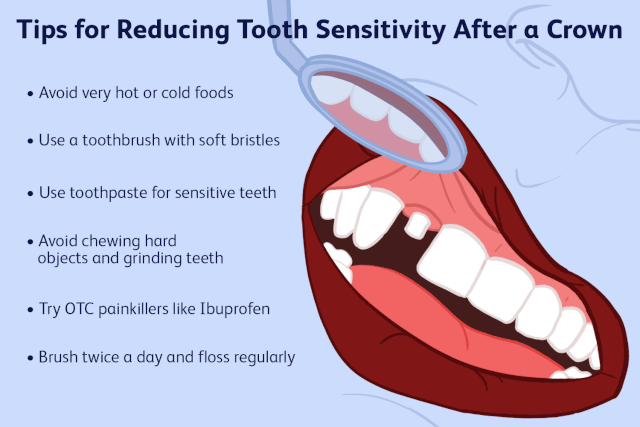Tooth Sensitivity After Crowns: What You Need to Know

Juan Algar/Getty Images
Medically reviewed by Edmund Khoo, DDS
Tooth sensitivity after a dental crown is common. You may experience cold or heat sensitivity as well as sudden bursts of pain or discomfort when biting down.
Tooth sensitivity after the placement of a crown usually resolves on its own within a few days or weeks. However, it can sometimes be a sign of a more serious concern, such as underlying tooth decay, a poorly fitted crown, or changes in the alignment of your upper and lower teeth.
The article looks at the symptoms and causes of tooth sensitivity after a dental crown, including how long you can expect the symptoms to last. It also offers tips on how to minimize tooth sensitivity and when it is time to see a healthcare provider.

Verywell / Laura Porter
What Causes Tooth Sensitivity After Crowns?
Tooth sensitivity after dental crowns occurs when the middle layer of the tooth, called dentin, is exposed to accommodate the artificial crown.
Dentin is usually covered with tooth enamel which guards it against stimuli like hot and cold temperatures or mechanical pressure. When the enamel is removed, thousands of tiny, fluid-filled channels in dentin (called dentinal tubules) are exposed to these stimuli.
When faced with changes in temperature or pressure, the fluid in the tubules will quickly move to the nerve-rich center of the tooth, called the pulp. The pressure placed on these nerves is what causes tooth sensitivity, also known as dentin hypersensitivity.
Certain factors can increase the risk of tooth sensitivity, including:
Cement from the crown: Certain types of cement used to bond crowns alter the pressure within dentile tubules as they cure. Some might also trigger allergies that cause gum inflammation and increased tooth sensitivity.
Tooth decay or infection: If the crown is properly placed or the dental cement comes off, bacteria can creep beneath the crown and cause an infection or tooth decay. Tooth decay is a leading cause of dentin hypersensitivity.
A poorly-fitted crown: If biting into food causes pain, there’s a good chance your crown is the incorrrect size. If a crown is too large or too small, biting down will place undue pressure on the underlying dentin and pulp.
Bite interference: Also known as malocclusion, bite interference is when the upper and lower jaw are not properly aligned. When biting down, the tooth on the opposite jaw might strike the dental crown at an angle, placing diagonal pressure on the underlying tissues.
What Triggers Sensitive Teeth After Crowns?
The main triggers for tooth sensitivity after a crown placement are temperature and mechanical pressure.
Certain sweet or acidic foods can also alter the movement of fluids in dentile tubules through a process known as osmosis. This is when water levels between membranes shift one way or the other until they are equal on both sides.
Possible triggers of tooth sensitivity after a dental crown include:
Eating hard foods too soon after the placement
Consuming very cold drinks and foods, including ice cream and popsicles
Consuming very hot drinks and foods, including hot coffee or soups
Overenthusiastic tooth-brushing, particularly with abrasive toothpaste
Using certain mouthwashes
Using a water flosser with cold water
Grinding your teeth (bruxism)
Breathing in cold air
Having underlying gum disease, including receding gums
Drinking alcohol or sweetened beverages
Eating citrus fruits or drinking citrus juice
Chewing gum
Chewing smokeless tobacco
How Long Does Tooth Sensitivity After a Crown Last?
Not everyone who gets a crown develops tooth sensitivity. Even if you do, what you may experience may be very different than what someone else experiences.
While it can take up to six weeks for tooth sensitivity symptoms to fully subside, in most cases, the pain and discomfort will ease within a few days.
Although you can expect to have some pain and discomfort after the placement of a dental crown, it is important to call your dentist if:
The pain is severe, persistent, worsening, or intolerable.
The pain lasts longer than four to six weeks.
Your bite is not lined up correctly after two weeks.
The pain is interfering with sleep or your ability to eat.
What Are the Symptoms of Sensitive Teeth?
Primary symptoms of dentin hypersensitivity include:
Immediate sharp or shooting pain when touching or applying pressure to the crown
Extreme sensitivity to cold or hot temperatures in the mouth
Sensitivity to acidic or sweet foods and drinks
Chewing differently to avoid tooth pain
Discomfort with tooth-brushing or flossing
Intolerance to abrasive toothpaste and mouthwashes
Tooth sensitivity is relatively common among people who have recently had a crown. Many, in fact, will start to experience symptoms as soon as the numbing agent has worn off.
A study in the American Journal of Dentistry reported that dentin hypersensitivity affects between 15% and 20% of the general population, increasing to 57% for those who have undergone a dental procedure.
Tips for Minimizing Tooth Sensitivity After a Crown
Though common, tooth sensitivity can be effectively managed or prevented. Here are a few things to do and avoid if you've just had (or are planning to have) a crown placed:
Practice good dental hygiene: This is doubly important after the placement of a crown when gums and tissues are settling. This includes brushing effectively twice daily, flossing regularly, and avoiding sugary foods, drinks, and sodas.
Avoid scrubbing: Use toothbrushes made with soft bristles that place minimal pressure on teeth. Avoid aggressive brushing and instead use soft, circular strokes. If flossing causes pain, invest in a water flosser like Waterpik, using lukewarm water and a gentle setting.
Use sensitive toothpaste: Your dentist may recommend an over-the-counter toothpaste specially designed for sensitive teeth. Many of these include active ingredients like strontium chloride, stannous fluoride, calcium sodium, and arginine.
Chew carefully: Avoid extra-crunchy foods, like raw carrots, hard crackers, and hard candies, until your tooth sensitivity settles. If you find chewing uncomfortable, chew on the opposite side of your mouth or eat softer foods until the symptoms ease.
Avoid grinding: Be mindful of the habit of grinding teeth. You can also speak with your dentist about a bite guard if you find yourself grinding your teeth at night.
Use painkillers: Over-the-counter analgesics like Tylenol (acetaminophen) or nonsteroidal anti-inflammatory drugs like Advil (ibuprofen) can provide occasional, short-term relief of pain.
Summary
Tooth sensitivity is common after the placement of a dental crown. Symptoms like pain and cold or heat sensitivity can be severe in some people, but they tend to ease in a few days. In some cases, it can take up to six weeks for the sensitivity to fully subside.
Good dental hygiene, gentle tooth care, the avoidance of problematic foods, and the judicious use of over-the-counter painkillers can help you manage until the symptoms fully settle.

